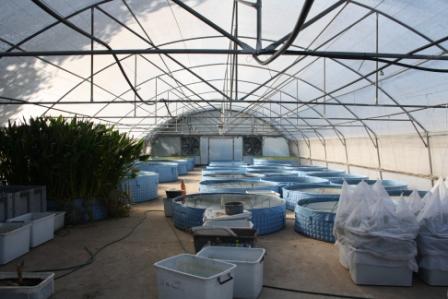
School pupils, disabled people and even a former prisoner are helping the Rhodes University Department of Zoology and Entomology with a R9m project to control aquatic weeds using biological methods.
Alien invasive aquatic species such as the water hyacinth, parrot’s feather, salvinia, water lettuce and red water fern are draining the country’s scarce water resources, clogging its waterways, and destroying indigenous plant and other aquatic life. Enterprising Rhodes Entomology Professor Martin Hill and his team raised millions from the Department of Water Affairs’ Working for Water Programme to reduce these pests through natural means.
The project focuses on the pre-release research and mass-rearing of insects that target the weeds, as well as implementation and post-release research. There are currently 350 sites where biological control is being successfully implemented across South Africa.
Prof Hill believes that the project shouldn’t just be academic. “We have an obligation to implement outcomes of research for the betterment of the environment and society as a whole.”
He also believes that this should go beyond the actual intention of the project – which is to reduce the number of waterweeds through the use of biological agents to improve the quality and quantity of water. He says awareness-raising, capacity building and an emphasis on transformation is vital and the programme’s commitment to these elements was a central reason for WFW’s willingness to fund the project.
With this in mind, the team invited local school pupils to assist. The Department currently collaborates with Victoria Girl’s High School in Grahamstown and employs five of their grade 10 and 11 learners, Leletu Ndabeni, Zikhona Gqamana, Jessica Wentworth, Ashleigh Allner and Leabona Luthuli, to work on the project during their vacation time.
“This programme has enthused the learners to get involved in weed biological control, to the extent that they drew up a proposal to fund a mass rearing programme of water weed bio-control agents at their school,” says Prof Hill. “Not only will this build capacity in weed biological control, but it will promote public awareness about the threat that aquatic weeds hold for South African ecosystems, and it will enable the school to raise money.”
The new funding will enable them to initiate a small insect mass-rearing facility at the school and expand the programme to other schools in the area.
The project also employs three disabled men, Mr Lulama Poni, Mr Kholekhile Mpako and Mr Lungisile Koliti and a former prisoner. They have been trained in weed biological control and bear the responsibility of mass-rearing, collecting and releasing the insects at various sites. “They have been trained in weed biological control and have been provided with all the necessary resources to ensure that they have insight into what they are doing and why”. Prof Hill said their work had resulted in the release of a “significant number of biological control agents”.
